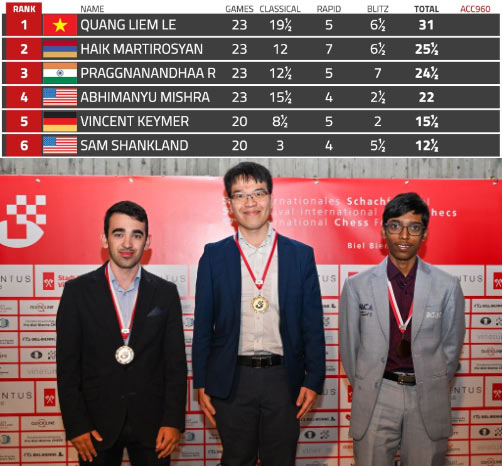
The Biel Chess Festival stands out on the international circuit, particularly for its innovative approach to competitive chess. Breaking from traditional single-format tournaments, Biel champions a unique “Chess Triathlon,” a format now inspiring similar events globally.
This triathlon challenges players across three distinct time controls: classical, rapid, and blitz. The ultimate champion isn`t determined by dominance in just one format, but through cumulative points earned across all three. It`s a test of comprehensive chess skill, demanding adaptability and strategic depth across varying game speeds.
The Format Breakdown
True to its unique nature, the Biel Festival features two invitational tournaments: the prestigious Masters and the competitive Challengers, each comprising six players. The structure is divided into a Qualification Phase and a Final Phase.
Qualification Phase
The qualification stage puts players through round-robin tournaments in each of the three formats:
- Classical: A single round robin where every player faces every other player once.
- Rapid: Another single round robin, with the interesting twist of reversed colors relative to the classical games.
- Blitz: A double round robin, ensuring players get a chance to play each opponent with both colors.
Final Phase
Following the qualification stage, the top performers advance to a Final Phase. This phase involves return matches played under classical time controls. The number of players who advance depends on the point standings, typically the top four, although the cutoff can be adjusted if the fourth player is significantly behind. Crucially, players carry their points accumulated during the qualification phase into the final stage.
A Unique Scoring System
Biel employs a distinct points system designed to appropriately weight performance across the different formats:
- Classical Games: A win is highly rewarded with 4 points. A draw earns 1.5 points, reflecting the significant effort involved in classical play, and a loss receives 0 points.
- Rapid Games: Wins are worth 2 points, draws 1 point, and losses 0 points.
- Blitz Games: The fastest format yields 1 point for a win, 0.5 points for a draw, and 0 points for a loss.
This differential scoring clearly emphasizes the classical portion of the tournament while still making strong results in rapid and blitz essential for overall success. It`s a system that rewards consistency and versatility.
Breaking Ties with Freestyle Chess
In yet another nod to innovation, the festival has a unique method for breaking ties in the final standings: a Freestyle Chess (also known as Chess960) opening tournament. Supported by foundations like Accentus, this tiebreaker ensures that players rely on their pure chess understanding and adaptability from a randomly generated starting position, rather than pre-game opening analysis. It`s a refreshing way to decide a champion.
Highlighting the Masters Tournament Action
The Masters tournament consistently features some of the world`s top players navigating this challenging format. For instance, a rapid game played on July 13, 2025, in the Masters saw German Grandmaster Frederik Svane (rated 2659) secure a victory against Polish Grandmaster Radoslaw Wojtaszek (rated 2651). Such games exemplify the high-stakes and intense competition characteristic of the Biel Chess Festival.
The Biel Chess Festival continues to push boundaries in competitive chess, offering a comprehensive and exciting test of a player`s complete skillset across the spectrum of time controls. It`s a format that demands not just deep preparation, but also quick thinking and adaptability – a true triathlon of the mind.











